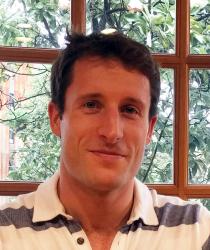
Ben Browne’s connections with Bedales were readily apparent before he ever arrived at Dunhurst. His parents lived at the Old Vicarage on Church Road and he followed two siblings to school. “Both my brother and sister had been at Dunannie and my sister went all the way through Bedales, although my brother left early and went to Winchester instead,” Ben explains. “I started in Dunhurst and I have to say, I took to the place at once. The thing about Bedales is that it allows you to be yourself and you have the time to work out what that actually is, whether it involves sport or building a chicken-hutch!”
For Ben, sport was a critical part of his development at Bedales, an area in which he insists that the school’s achievements are frequently underestimated. “We were pretty good at hockey, which I really enjoyed, and although I loved the outdoor stuff, it was sport that was my main interest,” he reflects. “In an ideal world, I would have done plenty of both but sport took over. I was very much into judo, for example, and I was one of those who started up a new club so that we could practise it regularly.”
Academically too, there was plenty of inspiration to be tapped into at Bedales. For Ben, that was particularly true of the sciences. “Given that I was particularly into physics, Tobias Hardy was a particularly important mentor for me,” he observes. “He was always very passionate about the subject and had a brilliant way of communicating that. In chemistry, there was also Harry Pearson, who took the time to give me the one-to-one coaching that I needed to make progress. I never felt that I was the only person out there with a scientific bent and all my teachers were extremely encouraging about the path that I chose. Science might not have been the norm for everyone but that never meant that you couldn’t go your own way at Bedales, which is definitely not the case at every school.”
Opportunities were plentiful at Bedales for Ben – almost too much so. “It was virtually impossible to try everything because there were just so many things that you could have a go at,” he recalls. “I took part in a play, I had guitar lessons and so on and I’m not sure that I scratched the surface. There were so many interesting people at school and you forget that it’s not always going to be like that as you go through life.”
As he embarked on university life at Cambridge University, Ben remained uncertain about where professional life might take him. “I’ve always been unsure about my future to some extent,” he laughs. “Before university, I’d been captivated by reading Stephen Hawking’s A Brief History of Time, which initially led me to a desire to study particle physics. I soon realised that the level of maths entailed by that wouldn’t be playing to my strengths so I switched to studying astrophysics and semiconductor physics at Cambridge. All the time, though, I was becoming increasingly interested in that place where science meets the environment and I felt that I really wanted to do something useful in the energy field. I looked into fusion at first but ultimately I decided on solar energy, in which I took my PhD at Imperial College, London.”
Researching new ways of making solar energy more efficient was to prove quite an eye-opener for Ben. “Being responsible for so much of my own work was very good experience for me and I enjoyed my time at Imperial, which is an ideal place for post-graduate study, but I’d basically decided that I didn’t want to be an academic, even though I did stay on for a bit of post-doctorate work,” he says. “I really wanted to do something that would have useful and immediate consequences.”
In 2010, Ben therefore interviewed for a job with Quantasol, a company involved in the development of solar energy which was shortly to be bought out by an American entity which immediately offered Ben a job in California. “I received the call offering me the job while I was at Glastonbury,” is his amused memory. Eighteen months later, however, with the global price of solar panels in freefall, the solar division in which Ben worked was laid off. He was still excited by the idea of developing technologies with a positive environmental impact, however, and that goal led him to his current R&D work at Lumileds, who develop, manufacture and distribute innovative LEDs.
Ben has now been based in San Jose for some five years. Although his is an enviable lifestyle in the part of the world most in tune with his field of expertise, he does admit to considering a return back to the UK at some point. “Realistically, if I were to go back to the UK, I would probably have to think about a change in career, since research and development in this specialism only exists in a few pockets of the world, like Silicon Valley,” he says. “For example, one particularly exciting area is the way that the electric grid is now moving from a few centralised power plants to a market place for energy in which everyone can buy, sell and store their own electricity. There are many interesting problems in this area, particularly in data science.”
The thought prompts Ben to think back once again to his Hampshire school days. “I used to get back a lot and I’ve got a huge amount of affection for places like the Hangers and the Harrow pub, but my family no longer live on Church Road and it’s not as easy for me these days,” he says, perhaps a shade wistfully. “My memories of school are generally extremely happy ones; as a teenager, life rarely seems to be completely smooth sailing but Bedales memories are usually rosy ones for me, if not rose-tinted.”
Ben Browne was interviewed by James Fairweather in March 2016.
